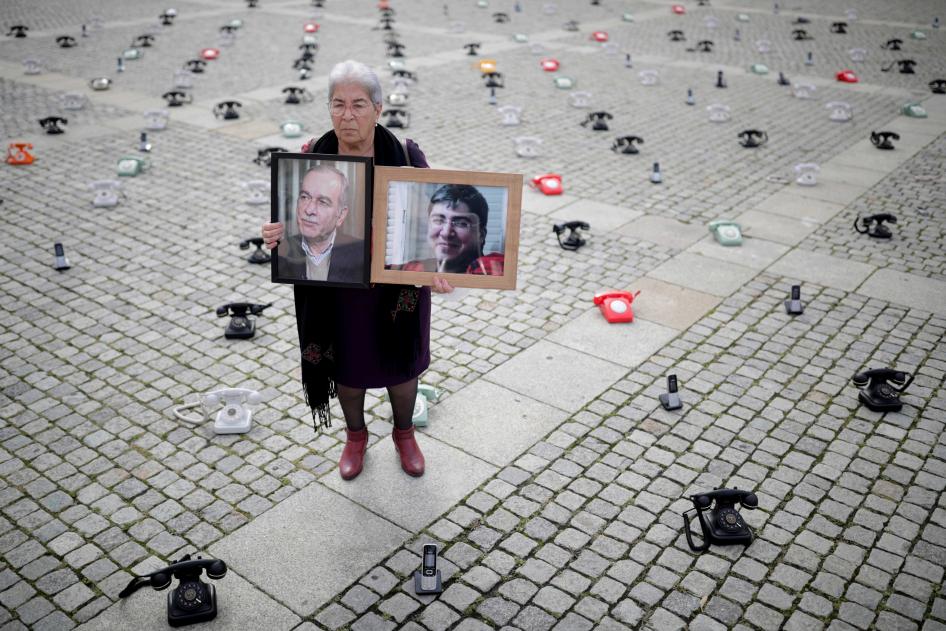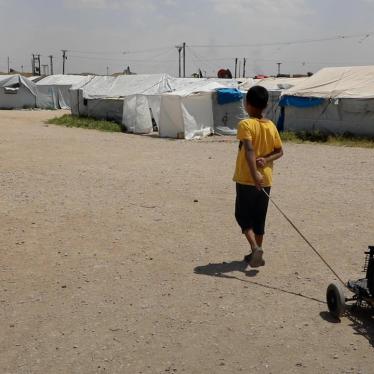(Beirut) – United Nations member countries should establish an international, independent entity to track and identify those missing and disappeared since the start of the Syria crisis in 2011, Human Rights Watch and Amnesty International said today.
The Syrian conflict has been marked by prolonged arbitrary detention, torture and other ill-treatment, and forced disappearance at the hands of all parties to the conflict. UN Secretary-General António Guterres proposed the mechanism in a landmark report published in August 2022 on how to bolster efforts to address the thousands of detained and disappeared and provide support to their families.
“The practice of “disappearing” people in Syria has left a devastating legacy for hundreds of thousands of people and their loves ones,” said Adam Coogle, deputy Middle East director at Human Rights Watch. “A new international entity to address this devastating unfinished business that can never be overlooked from the Syrian conflict offers a glimmer of hope for families.”
The government of Syrian President Bashar al-Assad has been responsible for the vast majority of those disappearances, which frequently result in deaths in custody and extrajudicial executions. Even before the crisis began in 2011, Syrian authorities forcibly disappeared people for peaceful political opposition, critical reporting, and human rights activism. Non-state armed groups have also abducted people, with some like ISIS taking hostages and summarily killing them.
As of August, the Syrian Network for Human Rights estimated that around 111,000 people remain unaccounted for, most believed to have been in the hands of the Syrian government. The exact number cannot be determined because the overwhelming majority of detention facilities, especially those run by the intelligence forces, are off-limits to outsiders. Those detained by government security services or many of the non-state armed groups in Syria are routinely subjected to enforced disappearance or held incommunicado, with families unable to get information about the whereabouts of their loved ones or what happened to them.
Groups representing families of people formerly detained, as well as Syrian civil society and international human rights organizations, have tirelessly advocated on behalf of torture victims and the thousands who have been disappeared, arbitrarily detained, and kidnapped, calling for a robust independent body to investigate thousands of disappearances. Most recently, 10 Syrian victims’ associations laid out their views on what such a body should look like.
Consistent with the views of the Syrian victims’ associations, the secretary-general’s August report acknowledged the systemic challenges families across Syria face when seeking information about their missing loved ones and highlighted the gaps in current efforts. The secretary general also set out the proposed mandate and priorities of a new body for this purpose, including providing adequate support to victims, survivors, and their families. Such a body would offer a single avenue to register new cases, as well as coordinate with other existing mechanisms, to build upon the wealth of available information and streamline efforts to tackle this issue.
“Eleven years into the conflict and the Syrian government and armed opposition groups continue to disappear or abduct anyone who opposes them, while their allies, Russia and Turkey, do nothing to stop these violations,” said Diana Semaan, Amnesty International’s acting deputy director for the Middle East and North Africa. “As tens of thousands languish in detention facilities or elsewhere, there are no reliable avenues for families to learn the fate and whereabouts of their loved ones. The lack of political will to address this issue has only prolonged the suffering of families. The UN SG’s proposal provides a way to fulfill the families’ right to truth and member states should rally behind it.”
The UN Commission of Inquiry on Syria has thrown its weight behind the secretary-general’s proposal, with the commissioners announcing in an opinion piece for Al Jazeera English that the considerable wealth of information the Commission had collected over 11 years will be made available to the new mechanism. The commissioners also warned that the longer it takes to establish such a mechanism, the more difficult it will be to clarify the whereabouts and fate of the missing and those forcibly disappeared. “Families have waited far too long for action at the international level,” the commissioners said. “The time to act is now.”
Member states should do everything in their power to ensure that a new international body in line with the secretary-general’s recommendations is established quickly through General Assembly action. Countries with influence in Syria should also put pressure on parties to the conflict to act swiftly to resolve what has come to be seen as one of the major tragedies of the Syrian conflict, Human Rights Watch and Amnesty International said.
Russia and Iran, the most prominent backers of the Syrian government, should press the government to immediately publish the names of everyone who died in Syrian detention facilities, inform families of the deceased, and return the bodies to their relatives. They should also press the government to provide information on the whereabouts of and what happened to all those forcibly disappeared, end the practice of enforced disappearance, and allow independent humanitarian agencies access to detention facilities.
Backers of non-state armed groups, including Turkey, Saudi Arabia, and the United States, should compel groups they support to reveal what happened to the detainees in their custody and allow humanitarian agencies access to their detention facilities.








